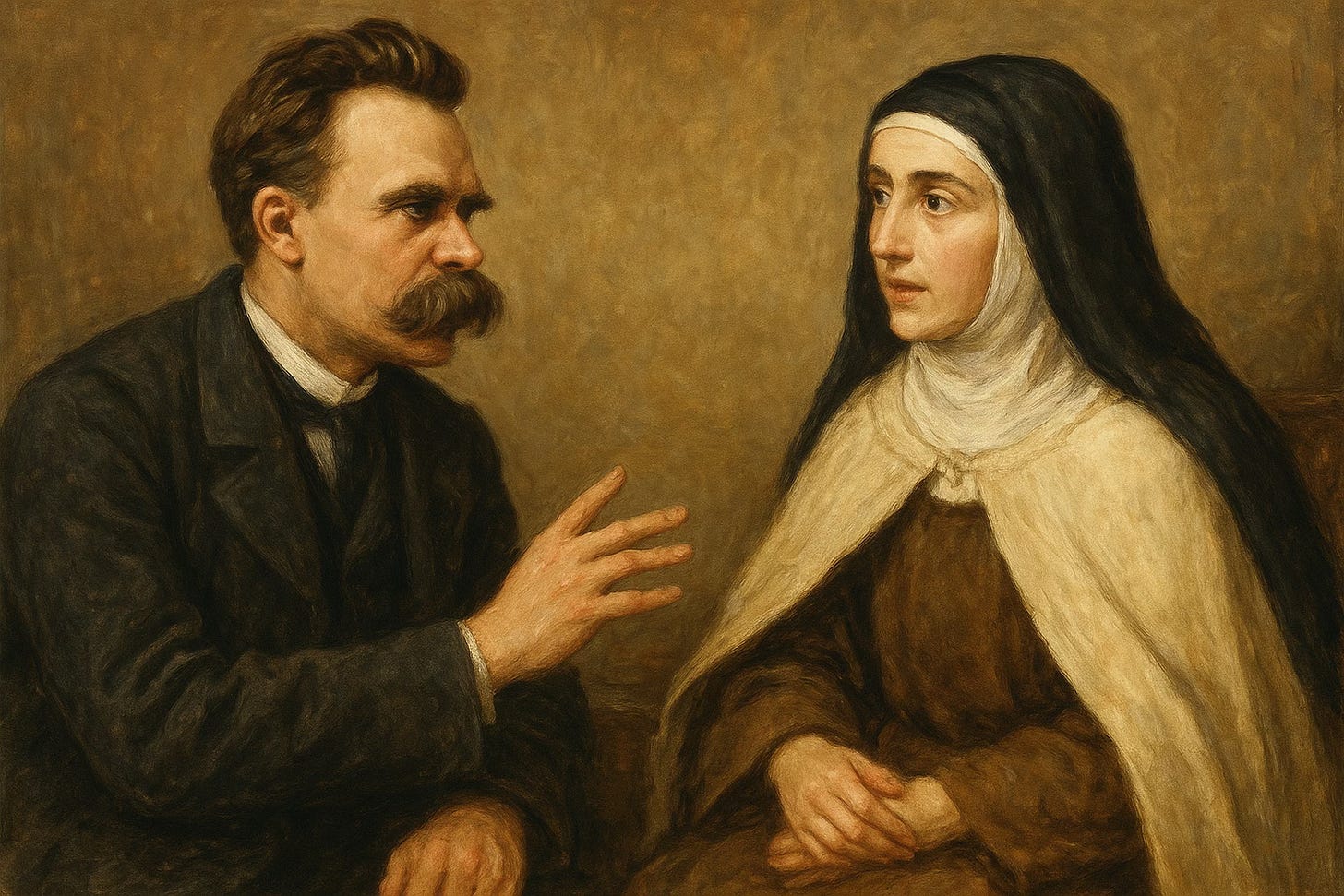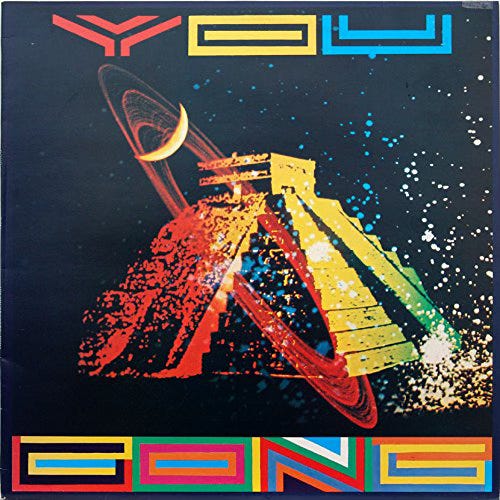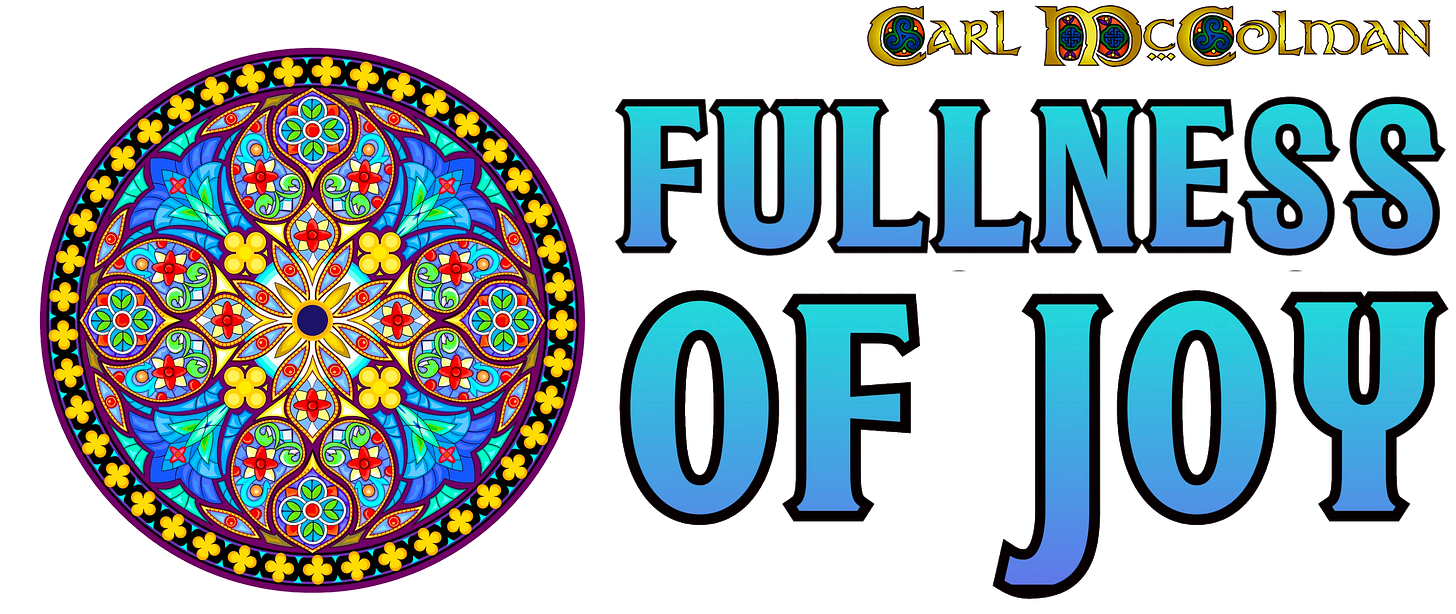
To reach satisfaction in all
desire satisfaction in nothing.
To come to possess all
desire the possession of nothing.
To arrive at being all
desire to be nothing.
To come to the knowledge of all
desire the knowledge of nothing.
— Saint John of the Cross
What is the connection between mysticism and nihilism? A reader recently asked me to comment on this possible relationship. I’m not an academic theologian or philosopher, so I can only offer a pretty basic response; nevertheless, here we go.
Is mysticism nihilistic?
Someone could easily get that impression, especially if they spent much time hanging out with the apophatic mystics like Pseudo-Dionsysius, Meister Eckhart, the anonymous “Cloud author,” and John of the Cross (quoted above).
Other mystics, from Hildegard of Bingen to Julian of Norwich to Teresa of Ávila to Pierre Teilhard de Chardin, hardly seem nihilistic at all: indeed, their spirituality is often profoundly and beautifully affirming of life, creation, the love of God, and so forth.
It’s only those pesky apophatic mystics, writing books with grim titles like The Cloud of Unknowing and The Dark Night of the Soul, who make it seem like the mystics were the medieval existentialists, all tricked out in black berets and reading beat poetry at the local coffee shop.
So perhaps our first task to unpack the nihilism that seems to be found within mysticism is to consider the landscape of apophatic spirituality.
As I have written previously in my blog, apophatic literally means “to speak off and away” and is typically used to refer to forms of prayer or spirituality that emphasis the ultimate unknowability of God — and therefore, a type of spiritual experience of not being able to “put God into words” or of recognizing that human language always seems to fall short of our efforts to fully express our experience or knowledge of God.
As I wrote in that blog post:
Apophatic prayer is prayer that occurs without words, images, or concepts. This approach to prayer regards silence, stillness, unknowing and even darkness as doorways, rather than obstacles, to communication with God.
I can certainly see this could be interpreted as “nihilistic” — let alone how the representative quotation from John of the Cross at the top of this post could come across that way. So let’s begin by looking at the possible nihilism within apophaticism.
What is nihilism?
Nihilism carries the following meanings, according to the Merriam-Webster’s Collegiate Dictionary, 11th edition:
A viewpoint that traditional values and beliefs are unfounded and that existence is senseless and useless…
A doctrine that denies any objective ground of truth and esp. of moral truths…
A doctrine or belief that conditions in the social organization are so bad as to make destruction desirable for its own sake independent of any constructive program or possibility…
(Capitalized): the program of a 19th century Russian party advocating revolutionary reform and using terrorism and assassination.”
Sounds pretty grim. Now let’s compare this to mysticism, again relying on Merriam-Webster:
The experience of mystical union or direct communion with ultimate reality reported by mystics…
The belief that direct knowledge of God, spiritual truth, or ultimate reality can be attained through subjective experience (as intuition or insight)…
A theory postulating the possibility of direct and intuitive aquisition of ineffable knowledge or power…
In full disclosure, Merriam-Webster does offer one less-than-friendly way of defining mysticism:
Vague speculation: a belief without sound basis.
I certainly hope that most people can see, even from these very simple and mainstream definitions of nihilism and mysticism, that there is quite a difference indeed between the two concepts. Nevertheless, let me see if I can offer us some additional insights.
One Gets Angry, the Other Gets Dreamy
To begin with, let’s compare the worst aspects of each concept. Nihilism, at least according to Merriam-Webster, is a philosophy which tends toward violence and destruction: there was even a Russian movement of so-called Nihilists who advocated for terroristic revolution and the assassination of their opponents.
By contrast, mysticism (again, according to the same authority, Merriam-Webster) merely seems to devolve into a much more harmless kind of shadow: at its worst, mysticism simply becomes a vague and dreamy kind of philosophy that has little basis in reality or fact, but certainly never calls for violence or harm.
Now, if mysticism and nihilism ultimately seem to point to radically different extremes, how is it possible for a reader of my blog to see them as connected in the first place? In other words, what do they appear to have in common?
Again, let’s be clear that it is specifically the apophatic mystics who are most likely to be misunderstood as “nihilistic.” But to equate apophatic mysticism with nihilism or even cynicism is a mistake, and hopefully we can unpack why this is so.
It’s worth keeping in mind this obvious difference: nihilism is a general philosophy, whereas mysticism is more properly deemed a theology (in our day we would say spirituality) because it is primarily concerned with God. I would imagine most nihilists are atheists or at least hard agnostics, so they would likely scoff at the mere mention of God.
Two Types of Agnosticism
As a type of spirituality, apophatic mysticism stresses God’s ultimate unknowability— the profound inability of humanity to ever fully capture the nature or personality of God. It sounds like agnosticism, doesn’t it? But I think it is a radically different agnosticism than the nihilistic or even cynical variety. Indeed, a few years back I wrote several blog posts on what I call “holy agnosis” — a mystical agnosticism, which says “We can truly know little or nothing about God, and isn’t that wonderful!” as opposed to our common secular understanding of agnosticism, which goes more like this: “We can truly know little or nothing about God, and therefore the entire concept is useless.”
If there is any reasonable point in assuming that apophatic spirituality is ultimately nihilistic, it seems to me that this is to say (borrowing from etymology) apophatic mysticism is a spirituality of radical nothingness (the Latin word nihil means “nothing at all”) or perhaps a spirituality of radical skepticism (I know that I myself have tended to view nihilism as the end result of skepticism).
But following the two different types of agnosticism I just described: what if the ultimate inability for human language to ever effectively communicate God, or for human reason to ever fully understand God, could lead us not just to a place of disillusionment and despair, but could just as easily take us to an entirely different destination? In other words, what if the “nothingness” at the heart of apophatic mysticism might actually lead us to radical humility and wonder which is in contrast to the tendency of secular skeptical nihilism, which leads to such an apparent breakdown in meaning that it tends toward cynicism, discouragement, and despair, that at its worst could even make violence plausible or even attractive?
Let’s put Merriam-Webster back on the shelf and I’ll offer my own way of defining mysticism. By my way of defining it, mysticism is a type of experiential spirituality that stresses God as a profound mystery that is best met in silence (μυέω, the Greek word that is the foundation of “mystery” and “mystic” and eventually “mysticism” is also related to the root of “mute” or silence). Mystics acknowledge, worship, and hope to experience a God who, paradoxically, is ultimately unknowable (hence the “Cloud of Unknowing”) and who cannot be exhaustively comprehended by the light of human reason (hence the “Dark Night of the Soul”).
It seems to me that this recognition of divine unknowability, hiddenness and mystery can be an occasion for humble, reverent wonder— but for someone who is not being guided well into the prime important of love in spirituality, such divine mystery might seem frustrating or maddening — which means, the recognition of divine inaccessibility could be an occasion for furious anger and cynical rejection of any sincere attempt to know God, even imperfectly.
In other words, one way of “meeting” the nothingness at the heart of apophatic mysticism is through humble wonder, and another way of responding to such impenetrable mystery is through seething anger that can lead even to violent rage.
One is mystical, the other is skeptical. One is wondrous, the other is furious. One is hopeful even in the face of mystery, the other is hopeless and therefore dismissive of mystery.
So the difference between mysticism and nihilism, it seems to me, is very much in the eye (and heart) of the beholder. Do we embrace the wonder of unknowing, bowing with gratitude and humility before this mystery, or do we reject such wonder and unknowing and its concomitant invitation into mystery, instead reacting with the slow seething burn of cynicism or the in-your-face renunciation of all that characterizes the slide into nihilism?
Let it Snow, Let it Snow, Let it Snow
Does it really boil down to “is the glass half full or half empty”? I believe so.
My first teacher of Christian meditation (what later we have come to call Centering Prayer) was a Quaker woman named Isabella Bates; I remember her describing one time being at a conference or meeting when it started to snow. She described how half of the people in the room immediately exclaimed with an almost childlike delight, “Ah! It’s snowing!” while at the same time, the others immediately grumbled, “Oh no! Not snow!” You see, the grumblers were worried about driving and how long it would take to get home, the chore of shoveling sidewalks, and all the other reasons that snow can be a problem. But the first group simply was caught up in the beauty and wonder of the snow. Naturally, they would have to drive carefully and slowly and put effort into snow shoveling just like everyone else, but this did not seem to dampen their sense of almost giddy pleasure at the sheer wonder of the sky filled with sparkling snowflakes.
“God is the name of the blanket we throw over mystery to give it shape.” — Barry Taylor
“God is the name of the blanket we throw over mystery to give it shape.” This quote comes from Barry Taylor, who was a road manager for the band AC/DC and went on to become an Episcopal priest (now there’s a story!) I met Barry Taylor at a Richard Rohr conference over 15 years ago; I thought he looked like he could have been Johnny Rotten’s brother; but I digress.
Back to the matter at hand: everyone from Meister Eckhart to a roadie-turned-priest agrees that mystery is simply what we encounter when we encounter God. And it seems that the deeper we dive into the mystery, the more mysterious it gets. Like Dr. Who’s TARDIS, it’s bigger on the inside than on the outside, so the mystery just keeps unfolding into ever-vaster dimensions of unknowing and nothingness.
Nihilistic? Maybe: but it’s a luminous nihilism, a “dazzling darkness” (in the words of both Pseudo-Dionysius and the metaphysical poet Henry Vaughan) that opens up into endless paradox, stripping us away of all our certainties and dogmas and beliefs, not to destroy us but to set us free. We are asked to trust this radical stripping away, and to the extent that we can do so, it may be terrifying but it is ultimately wondrous beyond words. Yet if we resist the dazzling darkness, it basically becomes the mystical equivalent of a “bad trip” — a terrifying snowstorm that only seems to confirm all our worst fears about just how horrible everything seems to be.
It’s our choice, really.
I can imagine someone asking, perhaps with a tinge of anxiety, “but what if I make the wrong choice?”
What if, despite all our best intentions, we tend to have the type of personality that is deeply programmed to be scared of snowstorms rather than filled with wonder when they arrive? Here again, I feel that I must protest my humility and mere layperson’s knowledge of human psychology, so I’m not sure I can answer this question completely or well.
But speaking purely out of my own experience… for you see, I myself am a recovering Chicken Little. I know what it’s like to go through life feeling like a blend of Cassandra, Eeyore, Marvin the Paranoid Android, and Squidward Tentacles. This is not the place to unpack my lifelong struggle with depression and anxiety, and I’m sure many people have had worse relationships with those challenges than I have, but let’s just say I do know something about it.
The fear is real. What if I make the wrong choice: What if I am trying to find mystical union with God, but because of my tendency to see the glass as half-empty, I end up simply lost in the grips of an unbelieving despair? Is cynicism, hopelessness, and even violence my necessary destiny? (Gulp!)
To make matters worse, the church — at least in its institutional form — makes it worse. That’s because institutional Christianity has been structured as a zero-sum, all-or-nothing game (you either get saved and go to heaven, but if you make a mistake… gulp!), anyone who sees the world through Eeyore/Chicken Little eyes can easily fall into despair, or at least profound anxiety — and it seems to me that encountering the mystery-we-call-God through the eyes of fearful anxiety makes it much more likely to wander, even unintentionally, down the despairing-nihilism corridor rather than the hopeful-wonder path.
You Never Blow Your Trip Forever
But where institutional religion fails us, something as unexpected as avant-garde rock music might just help out. In the 1970s a very strange and seemingly-perpetually-stoned band called Gong released several albums of eclectic jazz/rock/space music, with offbeat lyrics that seemed to blend science fiction with mythology and a great love for cannabis and psychedelia. They’re quite odd, but far more listenable (to my ears) than better known avant-gardists like Captain Beefheart or Yoko Ono (and a version of the band is still out there, touring around and playing their freaky music). Anyway, their album You (1974) features a song titled “You Never Blow Yr Trip Forever.” Never mind the lyrics, which again are just plain weird. Consider the simple but powerfully affirming message of the song’s title.
You never blow your trip forever. You cannot make a mistake so bad that there is no possibility of redemption or renewal or healing. It is impossible for a human being to do something that will change God’s infinite love and compassion for us (individually or collectively).
Yes, there are people out there who will tell you, or have told you in the past, that your mistakes can cost you forever. But guess what? They say so because they believe that, and believing that is their mistake. God is love, and love never ends. No matter how far down the road to nihilistic despair we might go, we are always invited back into the shimmering wonder of mystical hope.
Those of us who struggle with anxiety or despair are always invited to trust (even in the face of our most debilitating fears) that love wins — that the mystery covered with the God-blanket is capable of bringing us healing, transformation, transfiguration, and new life. We can learn to love the snowstorm, so deeply that without having to rehearse anything, when the snow comes we too can gasp with wonder rather than groan with discouragement. Depending on how deeply we have fallen into the trap of angst or despair, it might take quite some time to be healed. But healing is possible, and always available.
I’ll finish by saying that I think both nihilism and mysticism are ways we human beings respond to the existential void that we all intuitively recognize lies beneath all our language, all our beliefs, all our dogmas. Many of us simply refuse to acknowlede that abyss, and so we go through life as fundamentalists or ideologues or materialists or trapped in addictive or abusive behaviors. But once we see the void, we can’t unsee it. There it is. Now: do we run from it, or do we face it, trusting that the love in our hearts is capable of embracing even the vast emptiness emerging from the heart of God? If we run, the void just chases us. When we trust, we are invited into wonders beyond our imagining.
The first option is nihilism, and the second invites us into mysticism. You get to choose. But if you make the wrong choice, you can relax: you never blow your trip forever. Love will always be doing what Love can to find you, to cherish you, to care for you, to heal you, and to fill you with joy.
And this is what makes it clear that mysticism, far from being nihilistic, is the antidote to nihilism. Thank heaven.
Quotation sources:
Barry Taylor quoted in Comedy Sex God by Pete Holmes





